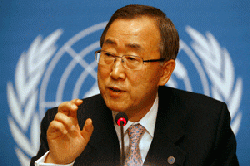UNITED NATIONS — Brushing aside a warning by the Israeli government and rebuffing a campaign by pro-Israeli lobbying groups in the United States, Secretary-General Ban Ki-moon has decided to visit Iran next week to participate in the summit meeting of the 120-member Non-Aligned Movement (NAM), described as the world’s largest single political coalition.
U.N. spokesperson Martin Nesirky told reporters Wednesday the secretary-general is “fully aware of the sensitivities (of his visit) and also fully aware of his responsibilities” (as a representative of the international community).
Responding to questions from reporters, he pointed out that it was customary for the secretary-general, as in previous years, to attend the NAM summit, which includes more than two-thirds of the members of the United Nations.
“It is an important and valuable platform,” Nesirky added, pointing out that the secretary-general has an obligation not to miss this opportunity to meet with Iranian officials at the highest political levels.
The discussions will include a wide range of issues, including the country’s nuclear programme, its role in the ongoing Syrian crisis, human rights, terrorism – and some of the recent anti-Semitic statements emanating from the political leadership in Tehran.
The Israeli newspaper Haaretz reported early August that Prime Minister Benjamin Netanyahu personally appealed to the secretary-general not to attend the NAM summit, describing Iran as “a regime that represents the greatest danger to world peace”.
Israel, which has threatened to unilaterally attack Iran on the ground that Tehran is developing nuclear weapons, does not want Ban to give legitimacy to the summit, scheduled to take place in the Iranian capital Aug. 26-31.
In an editorial titled “U.N. Chief Should Boycott Tehran Conference”, the Washington Post said last week that the conference promises to be “a festival of resistance to the United States, the U.N. Security Council and Israel”.
And the Anti-Defamation League (ADL), a strongly pro-Israeli lobbying group, urged Ban not to travel to Iran.
In a letter to Ban, ADL said: “Your presence in the Iranian capital at this time will be counterproductive to the efforts of the international community to bring Iran into compliance with its obligations under the Treaty on the Non-Proliferation of Nuclear Weapons and abandon its nuclear weapons ambitions”.
In a statement released Wednesday, the ADL said Ban’s visit “could be seen as rewarding the regime’s belligerence on the nuclear issue and escalating anti-Israel, anti-America, and anti-Semitic rhetoric and incitement”.
The secretary-general’s decision to attend the summit meeting, however, is being viewed as a rejection of all these arguments.
Nesirky said Ban will use the opportunity to convey the clear concerns and expectations of the international community on the issues for which cooperation and progress are urgent for both regional stability and the welfare of the Iranian people.
And over the past weekend, he said, Ban “was dismayed by recent remarks threatening Israel’s existence attributed to Iranian President Mahmoud Ahmadinejad and Supreme Leader Ayatollah Ali Khamenei and condemned the comments, which he described as offensive and inflammatory”.
At a briefing in Washington DC last week, State Department spokesperson Victoria Nuland said Iran is “a strange choice for where to hold this meeting particularly given how many aspects of their U.N. obligations Iran is not in compliance with”.
“We’ve made that point to the secretary general. And its just does not send a good signal.”
Still, Nuland refused to dissuade Ban from participating in the NAM summit.
Pressed further by reporters, she said: “I think our expectation would be that if he goes at this time that he will use the visit to make the point about our broad concern as an international community and the U.N.’s concern about the number of aspects of their U.N. obligations that Iran is flouting.”
Asked if the United States would prefer that he not go to Iran, Nuland said: “Again, he’s going to make his own decision. We’ve made our views known that we think that this is a strange place and an inappropriate place for this meeting.”
Asked if there was any city in the world that would be acceptable for this meeting to be held, Nuland responded, “Again, this is an organisation that we are not a member of. Our point is simply that Tehran, given its number of grave violations of international law and U.N. obligations, does not seem to be the appropriate place”.
NAM, which was created in 1961, has been chaired by 12 countries from the global South, including the former Yugoslavia, Algeria, Sri Lanka, India, Zimbabwe, South Africa, Malaysia, Indonesia, Zambia, and currently Egypt, which formally hands over the chair to Iran at the Tehran meeting.
Iran will be chairing NAM for the first time in the 51-year history of the movement.
– IPS






Leave a Reply